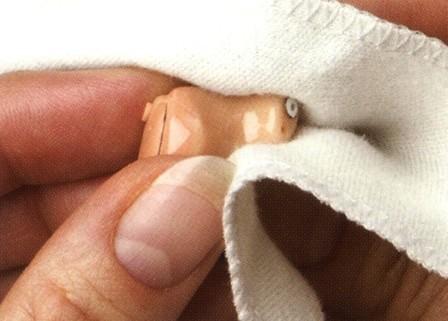[ad_1]
Your hearing aids are an investment in your overall health, and they are also very delicate. In order to keep them working properly for their intended lifespan, you must take proper care of them. While hearing aids don’t require a lot of maintenance, you will have to take precautions to ensure they are not damaged by water, ear wax build up, corrosion or dirt. Follow these simple guidelines and tips to maintain clean and working hearing aids:
Dirty controls
 Volume controls and battery contact points must both stay clean in order for your hearing aids to maintain proper function. While many hearing aids today don’t have volume controls, those that do feature a metal slide or wheel can get corroded. Try to rotate the control back and forth a few times. If the battery contact point is dirty or corroded, you will need to take the device to your audiologist’s office to get properly cleaned.
Volume controls and battery contact points must both stay clean in order for your hearing aids to maintain proper function. While many hearing aids today don’t have volume controls, those that do feature a metal slide or wheel can get corroded. Try to rotate the control back and forth a few times. If the battery contact point is dirty or corroded, you will need to take the device to your audiologist’s office to get properly cleaned.
Earwax issues
Ear wax buildup is one of the most common causes of problems in hearing aids, as the sticky substance can surround the microphone and receiver. This can create a muffled sound in your hearing aids, meaning you won’t be able to hear as clearly and loudly as you should. To reduce the amount of buildup, you should be regularly cleaning your ear canals. This can be done by a hearing care specialist, your family physician or you can use at-home techniques. Simply using a warm, wet washcloth to wipe out the entrance of the ear canal on a daily basis can help, as ear wax naturally works its way out of the ear. You can also use over-the-counter drops to loosen up wax, as long as you don’t have a hole in your eardrum.
Moisture problems
Water is a hearing aid’s worst enemy. While you can get protective coatings for hearing aids, it’s still necessary to expose your hearing aids to moisture as infrequently as possible. It is never recommended to wash hearing aids with water. The regular use of a dehumidifier is helpful for people who find moisture to be a regular problem. This is a simple container that you can place your hearing aids in while they are not being used.
Preventative maintenance
While you don’t need to give your hearing aids a deep cleaning every day, they should be wiped down after each use to prevent against buildup and reduce repair costs. A dry cloth or tissue will be sufficient to get rid of daily ear wax, dirt, oil and moisture from the surface. It will also help to use a dry brush on the receiver and vent tubes, which will be a little more abrasive and will remove the grime easily.
Before going to bed, make sure that you are storing your hearing aids properly in a protective container that will keep dust and dirt, as well as water or heat, at bay. Disengage the battery door to keep from corrosion in the compartment.
If you need more prevention and protection tips and techniques, be sure to ask your hearing healthcare practitioner for more information. In order to keep your hearing aids for as long as possible, it’s important to follow proper procedures and practices.
[ad_2]
Source link

